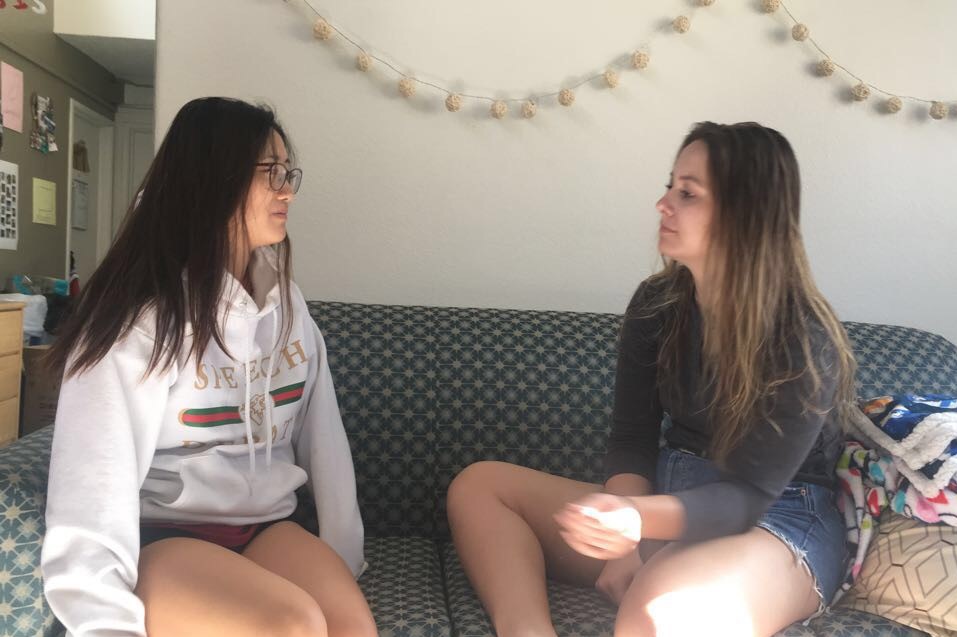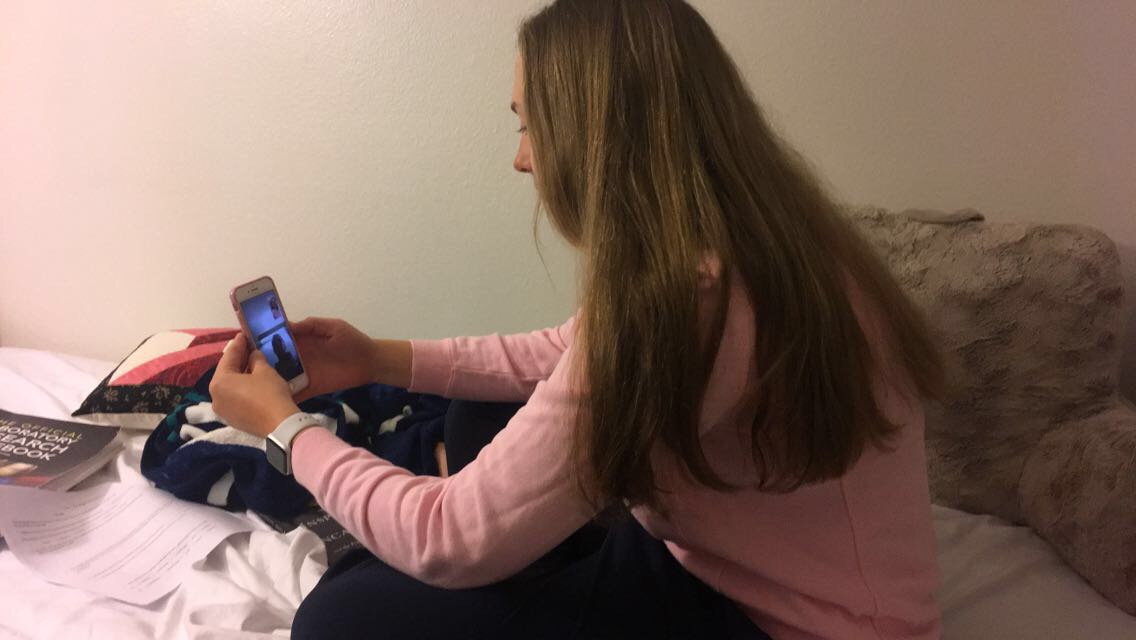
The saying ‘home is where the heart is’ gets a little more complicated when one’s heart is in more than one place.
College students often find themselves struggling in this situation. Many freshmen have a desire to quickly form new relationships but also want to stay connected to their old friends. This scenario can put pressure on students as they decide how they want to spend their time and which people are worth putting effort into.
“When you’re far away from home and far away from your friends it takes a lot more effort to keep those friendships,” said Derrick Klinker, a sophomore business administration major. “Putting in that effort wasn’t necessarily natural because it wasn’t something that had been a part of having those friendships before.”
A change in friendship dynamics can make it hard to keep up old relationships. A Pepp Post poll of 57 people showed approximately 41 percent of students have struggled to maintain their friendships from home. Interviews with 15 students showed that a lot of different factors play into this, including physical distance, personal growth and new relationships.
Starting different lives
Once students go off to college, their lives inevitably look different. Students said friendships are often based on things they have in common with others. If that commonality is taken away, the relationship can be tested.
Many students were aware that when they left for Pepperdine, they probably wouldn’t stay as close to old friends.
“It was very sad saying goodbye,” said Josephine Utz, a senior business administration major. “We kind of knew we’d never be as close as we had been.”
Students agreed being physically distant from people makes relationships harder. College is known for being a time of branching off and starting fresh, so some old relationships are bound to become less important.
Struggling to stay in touch
Most students do stay in touch with old friends, despite the difficulties physical distance can present. The vast majority of students talk to their college friends every day, but the frequency of communication with home friends varies widely.
Finding common ground to relate to old friends is one way students are able to continue their old friendships. Even if they don’t live together, they often share other experiences they’ve had in their time apart.
Lauren Drake, a freshman theatre acting major, said she found it was easier to talk to other college students who were also returning from school.
However, Drake also said she feels closer to her college friends.
“They know the better version of me,” Drake said. “I think I’ve become a better person being here — that the friends from high school know my senior self, which I’m not that person anymore.”
Other students have just learned to lean back on the old friendship and trust that there still is a genuine connection.
“They’ve been through more with me,” freshman chemistry major Audrey Camarillo said. “I’ve known them for five plus years, so a lot more stuff has happened.”
Though college can help facilitate new friendships and encourage their development, actual time can’t be replaced. Student interviews show old relationships often carry more significance when the people in them have gone through a lot together.
On the other hand, some students accept the fact that they are going to move on, at least somewhat, from their old friendships.
“When I go home I still see them,” Jenna Hale, a freshman liberal arts major, said. “So it’s not like we’re not friends anymore but we don’t text consistently.”
Making new friends
Roughly 54 percent of students polled said they were closer to their college than their high school friends.
Many students said their college friends now know them better. This is for a variety of different reasons but mainly physical proximity and growing together.
“My college friends know me better,” said Christopher Echevarria, a freshman political science major. “I didn’t entirely know myself in high school.”
College is a crucial period of life in terms of personal development. Students said the people that surround them during this growth period will become their closer friends since they understand each other best.
College friendships are easier because there are many close physical interactions. Communication Professor Lauren Amaro said physical proximity is one of the main reasons people develop relationships, which is often why students end up becoming close with their roommates.
“The first people who were immediately available to them became the people that they learned to live with and developed close relationships to,” Amaro said.
Additionally, some of the experiences of college naturally draw people together.
“Some of the relationship that I have at Pepperdine, even though I’ve only known the people for like four or five months, are more impactful and deeper than people that I’ve known for a really long time,” freshman chemistry major Bridget Johnson said.
However, sometimes students struggle with developing deeper relationships.
The Pepp Post poll found that nearly 34 percent of students had trouble making friends in college.
“Especially for guys, it’s hard to cross that level where you become really close,” senior chemistry major Christian Sanchez said.
For students concerned with focusing too much of their time and energy on either their old friends or their new friends, Amaro recommended setting a schedule to try and maintain boundaries.
Role of technology
In the modern world, staying connected has become much easier due to the rise of technology. However, those connections aren’t always the most genuine, and the existence of communication methods can put pressure on people to force relationships they don’t truly need or want.
Relationship IQ Director Kelly Haer said social media can invite shallow relationships.
“Technology, smartphones, texting, all of this really invites much more surface-level relationships that are not satisfying, ultimately, which leave people lonely,” Haer said.
The majority of American adults are considered lonely, according to a survey by Cigna Health Insurance. Haer said Pepperdine’s rate of loneliness is above the national average.
Trying to replace all in-person relationships with virtual ones isn’t healthy. Social media can, at times, create the illusion that someone has a lot of close friends, while they really don’t feel fulfilled with their social interaction.
“Social media is bad for keeping up relationships,” said Lilia Kerski, a senior political science major. “It sends you a message that you can keep up with a lot of people and have a meaningful relationship with a ton of people, and I think it’s more realistic to say, ‘OK, I’m gonna have a really meaningful relationship with a few people.’”
However, not all students have had a negative experience with technology. Some appreciate the ability to talk to old friends with ease and to keep up with their lives.
“FaceTime makes you feel more connected because you can see their face and react to them,” freshman chemistry major Peyton Lee said.

Effects of study abroad
Due to the high participation in Pepperdine’s study abroad program, many students end up living with their best friends one year and on opposite sides of the globe from them the next.
Often times, this can make it difficult for sophomores to maintain their friendships from their first-year experience. Though they will be back together by junior year, keeping up communication is still difficult.
“It’s definitely harder to be in constant contact with someone who’s here when you’re abroad because of the time change,” Kerski said.
Additionally, this can create a strange phenomena junior year when students feel as though they’re stuck between their freshman and sophomore friends.
“You make your freshman friends,” Haer said. “You leave them, you have your study abroad friends, you’re back and you don’t really feel like you’re connecting with the freshman friends or the study abroad friends.”
Haley Brouwer completed the reporting for this story under the supervision of Dr. Christina Littlefield and Dr. Theresa de los Santos in Jour 241 in Spring 2019. Dr. Littlefield supervised the web story.



